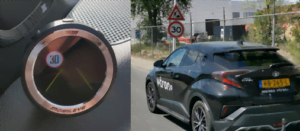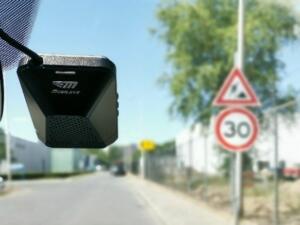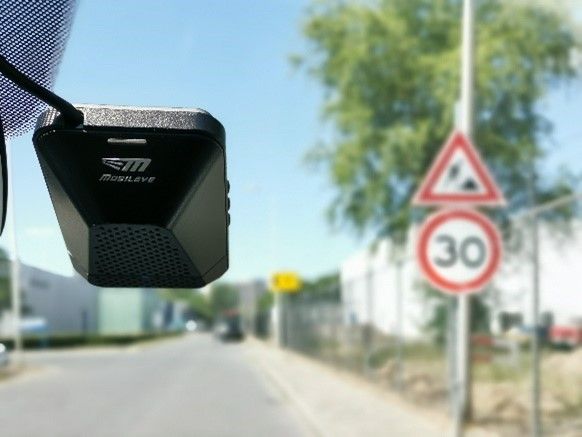Helmond: The city that puts road safety first
How has Helmond come to play host to some of Europe's leading smart mobility innovation initiatives? Isobel Duxfield spoke to the city’s Matthieu Graindorge and Gert Blom to find out.
Home to the Brainport Smart District and partner city for EU projects such as CoEXist and ReVeAL, the Dutch city of Helmond has been ground zero for smart mobility solutions for road safety and zero-emissions transport solutions. Thinking Cities talks to two of the people responsible.
Isobel Duxfield (POLIS): Helmond has established itself as a ‘living lab’ for road safety technologies like Intelligent Speed Assistance (ISA) - a technology which helps to prevent drivers from speeding. What is Helmond doing in regard to ISA?

Matthieu Graindorge, Senior Project Manager for Smart & Green Mobility at The City of Helmond, © Matthieu Graindorge
Matthieu Graindorge (MG): Helmond is trying to bridge the gap between automotive world and mobility world, using the innovation and power of technology to improve road safety. ISA is an in-vehicle system which supports drivers' compliance with the speed limit, using information on the position of the vehicle in relation to the speed limit in force at that location. We have established ourselves as a ‘living lab’ for Intelligent Transport Systems (of which ISA is an integral part), where new mobility concepts can be explored and tested on the ground.
Gert Blom (GB): A study by the Norwegian Institute for Transport Economics found ISA to be the ‘most effective’ driver assistance system for preventing collisions: this has also been supported by a more recent study from Transport Research London. They estimate ISA will prevent 20% of fatal accidents. Of course, this is tremendous if you think 25.000 people are killed every year on European roads. Preventing such catastrophe would be amazing. As a local authority, we are in a unique position to do so. We can, for example, mandate ISA in our procurement for public transport - as Transport for London did with the city’s bus system.

Gert Blom, Strategic Advisor for Mobility at The City of Helmond, © Gert Blom
POLIS: How does the ISA fit within the broader Brainport Smart District?
MG: Thanks to the ReVeaL project, we carried out a test on ISA systems in July this year in the nearby district of Brandevoort. We intend to carry out further and complementary tests next year in our Brainport Smart District (BSD). BSD, an area currently under development, will host leading high‐tech industries and companies in the automotive and mobility sectors. It aims to be a living lab, a place where new mobility concepts (as well as energy, health and housing solutions) can be explored and tested on the ground.

Helmond Automotive Campus
Pedestrian and cyclists are placed at the heart of the day-to-day life of Brainport Smart District. Through ReVeAL, our ultimate ambition is to make BSD not only a zero-emission zone, but also a safe district, a people-friendly environment. The deployment of ISA in vehicles can contribute to reach this objective- extended for use in all urban vehicles!
Intelligent Speed Adaptation (ISA) is an in-vehicle system that supports drivers' compliance with the speed limit, using information on the position of the vehicle in relation to the speed limit in force at that particular location. ISA can support drivers in helping them to comply with the speed limit everywhere in the network. ISA is in fact a collective term for various different systems; an open ISA warns the driver (visibly and/or audibly) that the speed limit is being exceeded, half-open ISA increases the pressure on the accelerator pedal when the speed limit is exceeded, and closed ISA limits the speed automatically if the speed limit is exceeded.
POLIS: What are barriers to implementation of ISA across Europe?
GB: First of all, up to now, ISA has not been mandatory in vehicles, so manufacturers and buyers can choose to have it on board or not. Another issue is people are not aware they have ISA already onboard; for example, Ford, Jaguar, BMW already have ISA systems on board, but these are not used as a selling argument. People simply do not know they have these features! There needs to be awareness raising, and we are calling for a national- and wider European- awareness raising campaign. Additionally, even if ISA is mandated in new cars by 2022, it may take up to a decade to have it retrofitted in existing vehicles.

ISA technology being trialled in cars, © v-tron
However, I do not think cost is a barrier to such retrofitting. Drivers already have GPS systems in their cars, and almost every new car has a camera on board too: hardwares and softwares are already there. We have been working on research into retrofitting cars and conducting pilots on this, although COVID-19 has complicated this initiative.
MG: I must add, the issue is not whether the ISA technology will be implemented or not, but rather how this technology is and will be further configured. The system must be on by default to be effective. For example, our tests in July for ReVeAL exhibited, that when drivers are required to switch on the system themselves, they forget, or do not bother to do so.
POLIS: What other feedback did you receive from drivers in these tests?
MG: Together with our partner V-tron, we received extensive feedback on our ISA tests. It was important for us not only to have quantitative speed data, but also the qualitative feedback from drivers. Admittedly, not all statements were positive. Drivers think ISA is useful - a majority consider it will have a significant added value for safety; particularly in the 30km zone. Nonetheless, there was a sentiment that when driving all day, using the ISA was, to put it crudely, a bit "boring!". We had two kinds of cars in the test, one where the ISA was easy to override, and one that included a retrofitted system and where the system was by default on and complicated to disconnect. Drivers liked the first more than the second - they liked to be able to disconnect it! My interpretation is some, by no means all, feel the system is a restriction to their liberty as drivers. This is undoubtedly a conversation we need to have when deciding how to configure this new technology.

Car testing ISA technology in Helmond, © V-Tron
POLIS: Do you think the roll out of ISA in all cars will precipitate a behavioural change in driving?
GB: It will make a difference. Today, if a driver is speeding without ISA, it is either purposeful, or unintentional. ISA will definitely eradicate the latter. Of course, it is possible to override the system - if you want to drive 100km in a 50km zone, you can. But now, if you speed, it is even more a conscious choice. It changes the conversation about speeding and the penalties which should follow.
Focus on Helmond
Helmond is a POLIS member city with around 90.000 inhabitants, located in the south of the Netherlands. It is home to the Brainport Smart District, a smart living and working district, that is equipped with the latest innovative solutions to function as an urban living lab for new transport, health, as well as energy generation and energy storage. Helmond is part of several additional EU projects including FABULOS, a project offering last mile solution services through innovative tender procedures for automated shuttles.
POLIS: Why are ISA testing and wider smart mobility initiatives so important for Helmond?
GB: Road safety is a key priority for us. It is our responsibility as a local authority. ISA is a way to come to a more intelligent solution to speeding. This is in the DNA of Helmond, to combine innovation, environmental impacts, and societal and economic goals. Our automotive campus is a smart mobility hotspot – it creates green jobs, helping our city maintaining a sustainable economy.
MG: For me, the key word for Helmond is ‘integration’. It is not just about ISA, it is about our integrated approach. As a living lab, our Brainport Smart District will put this into practice, not just through smart mobility, but also through sustainable energy, the circular economy, and citizen participation.
POLIS: How does Helmond’s partnership with Polis assist with ISA testing and the city’s wider smart mobility goals?

Helmond by night
GB: For us, as a SMC it is difficult to have influence on the European scale. With the help of POLIS this can be done. This has particularly been the case following POLIS’ establishment of its Small and Medium-sized City platform. For example, at the POLIS 2018 conference, we launched the ISA manifesto to raise awareness amongst stakeholders, an action not possible without POLIS. POLIS is the steppingstone to the EU arena, which for an SMC is incredibly important. We appreciate the way POLIS is helping smaller cities in bridging the gap between local and EU level. This partnership supports the inherent capacity of SMCs, proving that small is beautiful! We see the importance of this relationship emerging again with ISA. As a local authority, we endeavour to lobby and influence the discussion in Europe, as we think ISA could really help to increase road safety. Together with POLIS and the European Transport Safety Council (ETSC), we are able to raise these issues at the highest levels.
MG: The partnership also comes into play in many of our other European Projects- including C-MOBILE, SECREDAS, and CoExist. Helmond is part of ReVeAL, and several other European initiatives. We work side by side with POLIS on these projects, placing Helmond at the heart of the future of mobility.
SMC Platform – Giving a voice to small and medium-sized POLIS members
The POLIS SMC Platform brings together small and medium-sized cities to give them a dedicated platform to discuss governance issues, as well as challenges and solutions that are inherent to their shape and size. At the same time, the SMC Platform wants to promote SMCs to the outside world as living laboratories for innovation, as SMCs offer an ideal ground for testing and implementing new transport technologies and services that are crucial to solve the most pressing mobility challenges.
About the authors:
Isobel Duxfield is Communications Assistant at POLIS Network, iduxfield@polisnetwork.eu
Gert Blom is Strategic Advisor for Mobility at Gemeente Helmond, g.blom@helmond.nl
Matthieu Graindorge is Senior Project Manager for Smart & Green Mobility at Gemeente Helmond, m.graindorge@helmond.nl
 Car testing ISA technology in Helmond, © V-Tron
Car testing ISA technology in Helmond, © V-Tron